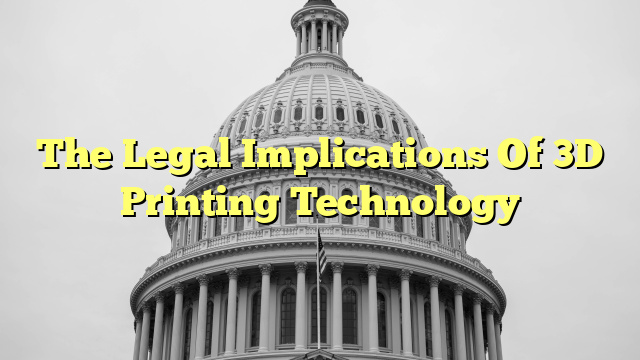However, there are some legal implications of this technology that need to be considered. This article will explore what those are and how they might affect the way 3D printing is used in the future.
Table of Contents
Ethical Implications
One of the ethical implications of 3D printing is the ability to print objects that are not typically available on the market. For example, some people might use 3D printing technology to create firearms, which are usually illegal to possess in many countries. Other people might use 3D printing to create objects that could be dangerous if handled improperly, such as knives or other sharp objects.
In addition, 3D printing could potentially be used to create objects that are not necessarily dangerous, but are still controversial. For example, some people might use 3D printing technology to create objects that are considered offensive or inappropriate, such as figurines or statues. This could lead to legal action against those who produce or distribute such objects.
Intellectual Property Rights
Another legal issue that could arise from 3D printing is the violation of intellectual property rights. In many cases, the object that is being printed may be an exact replica of a product that is protected by copyright or patent laws. This means that someone may be able to produce and distribute objects without obtaining the necessary permission from the original creator.
In addition, someone may be able to make money from selling copies of an object that is protected by copyright or patent law. This could have a major impact on the market for products that rely on intellectual property rights, such as books, music, and movies.
Regulations
Due to the potential legal issues that could arise from 3D printing, it is likely that governments will step in with regulations in the near future. These regulations could range from restrictions on what objects can be printed, to laws requiring users to obtain permission before printing certain types of objects.
In addition, it is likely that governments will impose taxes on 3D printed objects. This could be done in an effort to protect the interests of businesses that rely on intellectual property rights, or to generate revenue from the sale of 3D printed objects.
What is Illegal to Print?
In some cases, it may be illegal to print certain objects on a 3D printer. This could include objects that are considered dangerous, such as weapons or explosive devices. It could also include objects that are protected by copyright or patent law, such as books, movies, or music.
In addition, it may be illegal to print certain objects if they are deemed to be inappropriate or offensive. This could include figurines or statues that could be considered offensive or inappropriate by certain groups of people.
Finally, it is important to note that 3D printing regulations could vary from country to country. It is important to check with your local government to make sure that you are following all applicable laws before printing any objects on a 3D printer.
Conclusion
3D printing technology has the potential to revolutionize the way we think about manufacturing and prototyping. However, there are some legal implications that need to be considered. This article has explored some of the ethical and intellectual property issues that could arise from 3D printing, as well as the potential for regulations or taxes to be imposed on 3D printed objects.

